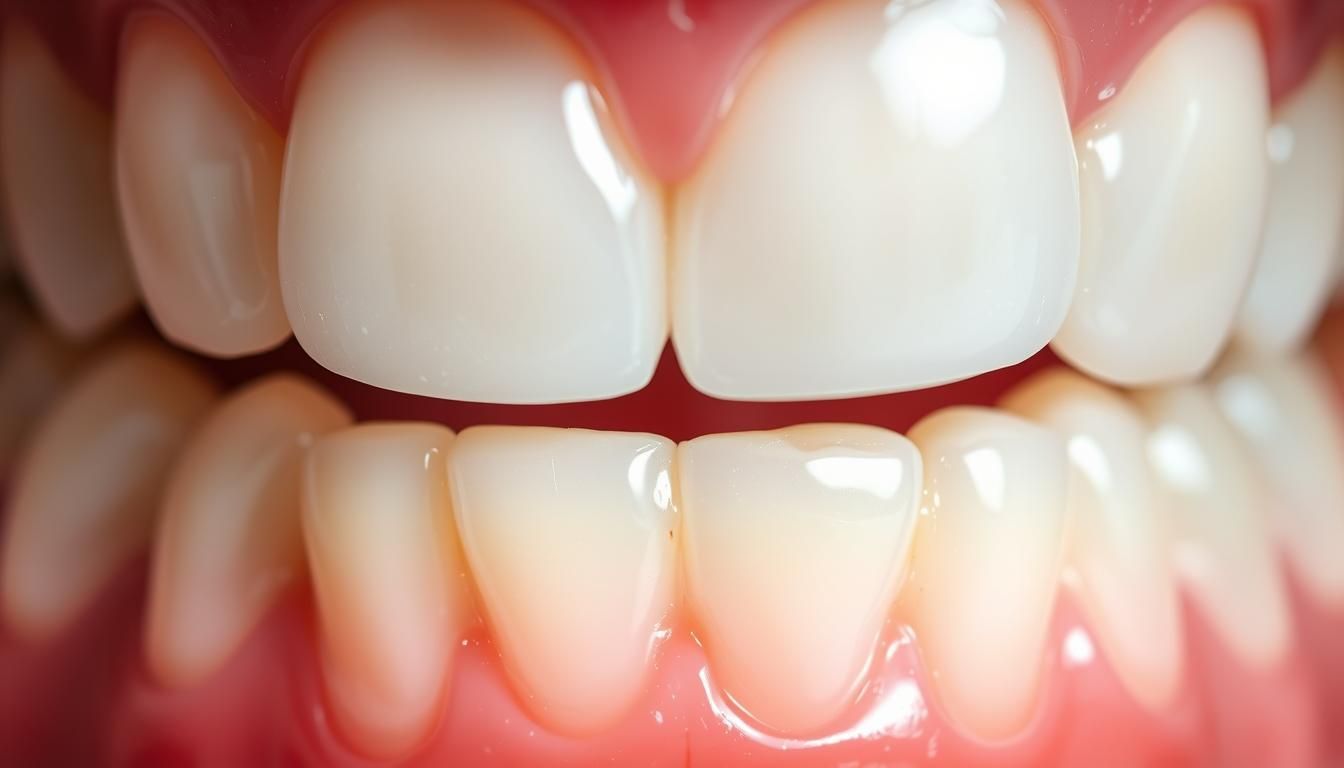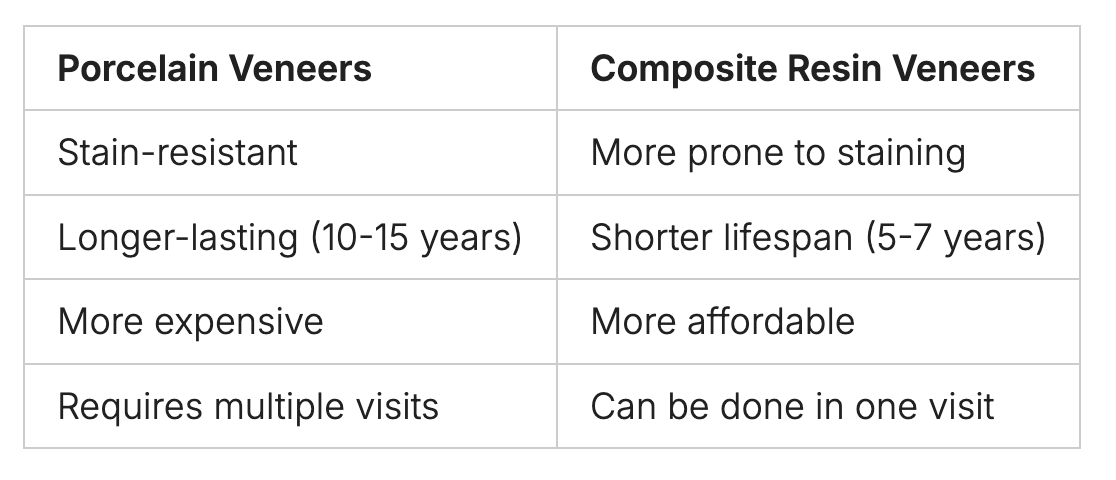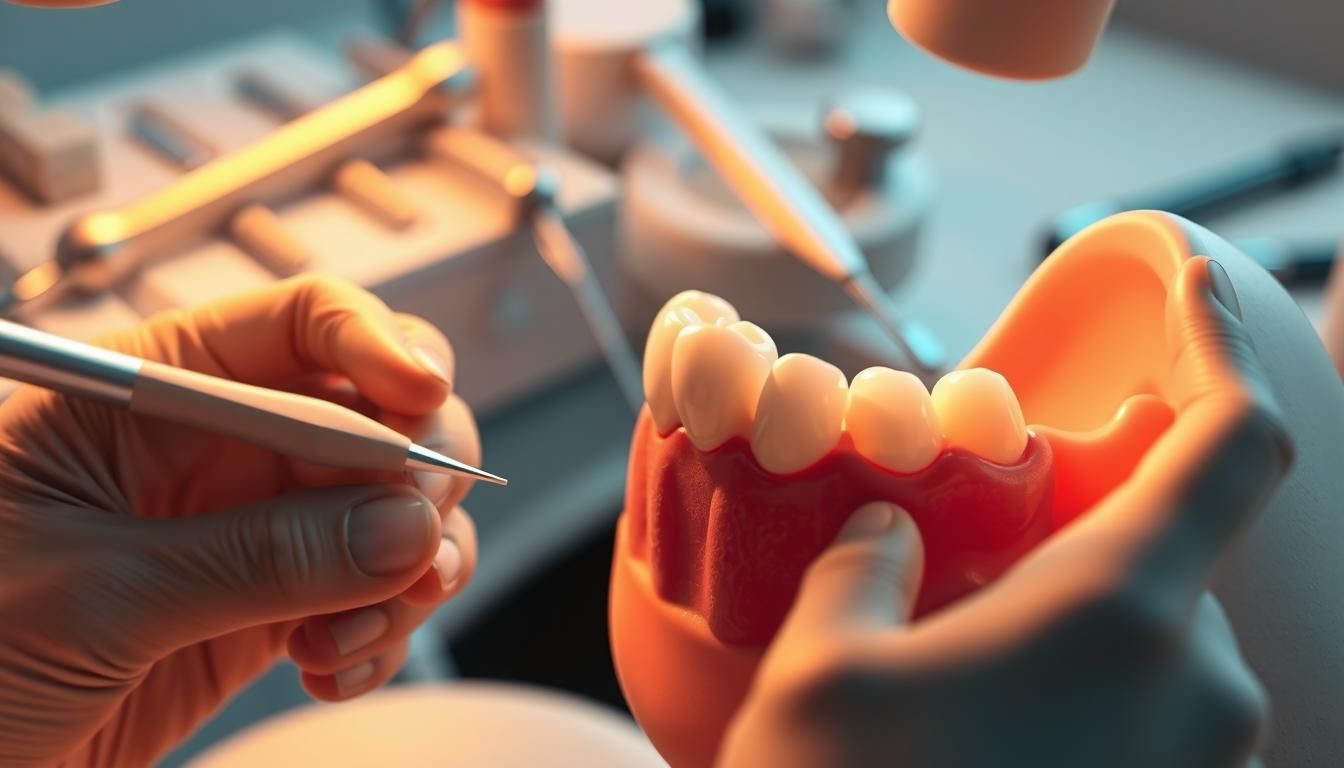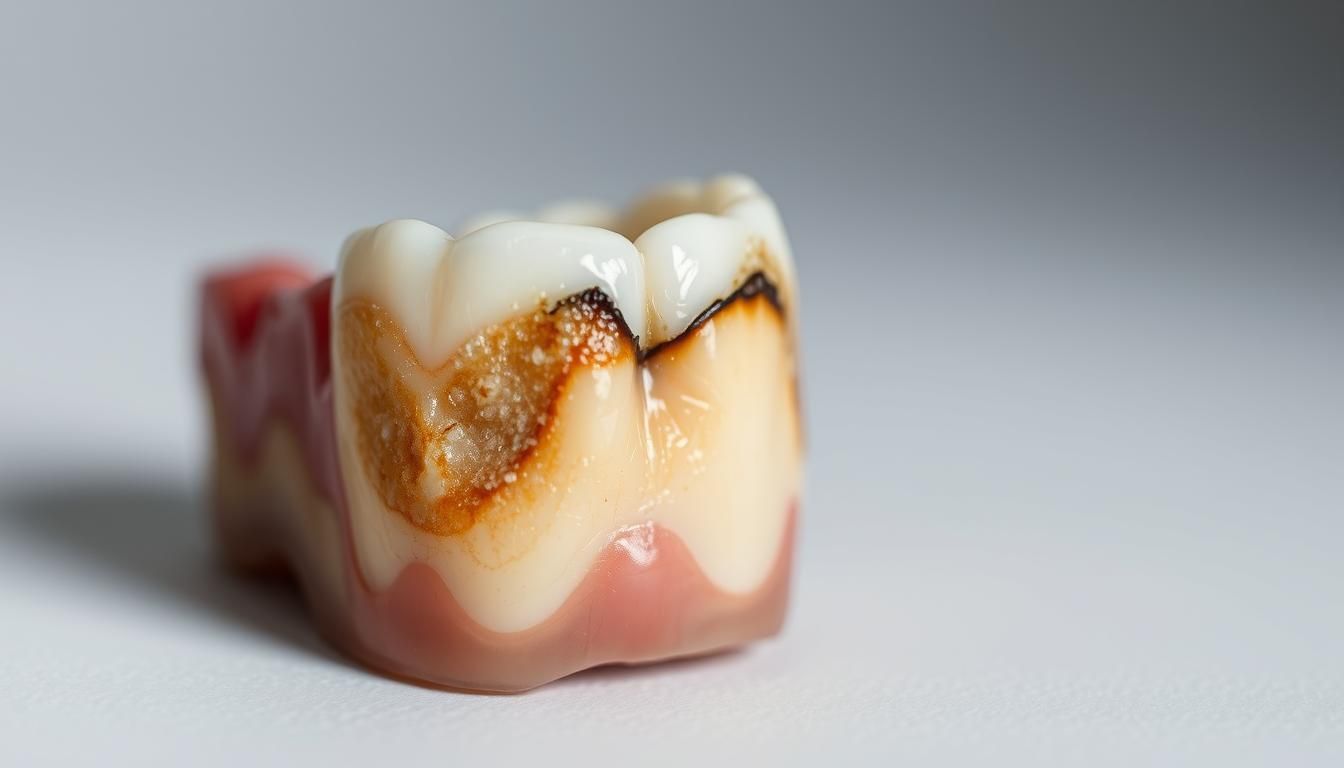New Patients & Dental Emergencies Welcome • We Speak English, Spanish, and Persian • 4444 Connecticut Ave NW, Washington DC, DC 20008 • (202) 363-2810
New Paragraph
Do You Keep Your Real Teeth Under Veneers?
Do You Keep Your Real Teeth Under Veneers?
Dental veneers are a popular choice for a perfect smile. Many ask, "Do you keep your real teeth under veneers?" Yes, you do. Veneers are thin shells that cover the front of your teeth, making them look better while keeping your teeth intact.
Veneers are a way to change tooth color, shape, and alignment without removing the tooth. They are great because they don't harm your teeth as much as other dental work.

Veneers are made just for you, fitting over your teeth for a natural smile. They fix many cosmetic problems, like color and alignment issues, without harming your teeth.
Key Takeaways
- Veneers are placed over your natural teeth, not replacing them
- Tooth preservation is a major advantage of dental veneers
- Veneers require minimal alteration of natural tooth structure
- They can address multiple cosmetic dental issues
- Veneers offer a natural-looking smile enhancement
What Are Dental Veneers?
Dental veneers are ultra-thin shells made from porcelain or composite resin, tailored to cover the front surface of your teeth. They are designed to improve the aesthetics of your smile by addressing issues such as discoloration, minor misalignments, chips, and gaps. Here’s a closer look at their role:
- Aesthetic Transformation: Veneers can dramatically change the appearance of your teeth, offering a uniform, bright, and natural look.
- Minimally Invasive: Unlike crowns or bridges, veneers require only minimal enamel removal, preserving most of your natural tooth structure.
- Customized Fit: Each veneer is uniquely designed to match your tooth’s shape, size, and color, ensuring a seamless integration with your natural dentition.
By covering the visible surface while leaving the underlying natural tooth intact, veneers maintain tooth integrity and function.
Veneers are a top choice for tooth restoration. They give a natural look that can change your smile a lot. Unlike other dental work, veneers don't need to alter teeth much, which is good for many patients.
Why Veneers Are Popular for a Beautiful Smile
Veneers are loved in cosmetic dentistry for many reasons:
- Versatility in addressing multiple aesthetic issues
- Quick and noticeable results
- Long-lasting enhancement of smile appearance
- Stain-resistant properties
- Minimally invasive procedure
Veneers are great for making smiles look better. They fix gaps, chips, and hard-to-whiten stains. For many, veneers are a way to get the smile they've always wanted. This boosts confidence and self-esteem.

Understanding Dental Veneers and Their Application
Your natural teeth play an essential role in the overall success of a veneer treatment. They provide the necessary structure and support for the veneers to bond effectively. Here’s why keeping your natural teeth is beneficial:
- Bite Stability: Your underlying teeth maintain proper occlusion (bite) and help distribute the forces of chewing.
- Oral Health: Preserving the natural tooth structure is crucial for long-term dental health. The tooth underneath still receives nourishment and can remain strong with proper care.
- Foundation for Veneers: Veneers are an overlay that enhance the visible portion of your teeth without altering the core structure. This means that even if a veneer needs to be replaced, the natural tooth beneath can still be preserved.
Types of Veneers: Porcelain vs. Composite Resin
There are two main types of veneers: porcelain and
composite resin. Each has its own features:

The Veneer Application Process
Understanding the step-by-step process of getting veneers can help alleviate concerns and set clear expectations. The application typically involves:
- Consultation and Treatment Planning:
- Assessment: Your dentist evaluates your oral health and discusses your cosmetic goals.
- Design: Digital imaging or wax-up models might be used to preview your new smile.
- Tooth Preparation:
- Minimal Enamel Removal: Only a small amount of enamel is removed to create space for the veneer.
- Precision Shaping: The tooth is reshaped slightly to ensure the veneer fits perfectly.
- Impressions and Temporary Veneers:
- Custom Molds: Precise molds are taken of your prepared teeth to fabricate the veneers.
- Temporary Solutions: Temporary veneers may be placed to protect your teeth and provide an aesthetic preview while your permanent veneers are crafted.
- Bonding:
- Cementing: The final veneers are permanently bonded using a specialized dental cement.
- Finishing Touches: The dentist makes any necessary adjustments to ensure proper alignment and bite.
- Each step is designed to safeguard your natural teeth while delivering a significant cosmetic upgrade.

Getting your teeth ready for veneers is key. It makes sure they fit well and look natural. Your dentist will shape your teeth carefully. This way, they fit the veneers well without losing too much of your natural tooth.
What Happens to Your Natural Teeth Under Veneers?
Many people wonder, "Do you keep your real teeth under veneers?" The short answer is yes. Veneers are not a substitute for your natural teeth—they are a cosmetic enhancement that improves the appearance of your smile while preserving the underlying tooth structure. Here’s a deeper look at how your natural teeth are involved in the process:
The Role of Your Natural Teeth
Your natural teeth are fundamental to both the function and aesthetics of your smile. They serve several key roles in the veneer process:
- Structural Support:
- Your teeth provide a stable foundation onto which veneers are bonded.
- They help maintain proper bite alignment, ensuring that your jaws function correctly during chewing and speaking.
- Aesthetic Base:
- Veneers are designed to enhance the visible portion of your teeth while working in harmony with the natural underlying structure.
- They cover imperfections, yet the natural tooth remains integral to achieving a balanced, natural look.
- Protection of Oral Health:
- Preserving your natural teeth ensures that the tooth remains healthy and functional, receiving the necessary nourishment and strength from your existing enamel.
- In the event that veneers need to be replaced, the natural tooth beneath remains intact, allowing for future treatments if needed.
Do Veneers Affect the Integrity of Natural Teeth?
The process of applying veneers does involve some alteration of your teeth, but modern dental techniques ensure that this is kept to a minimum:
- Minimal Enamel Removal:
- Only a small amount of enamel is carefully removed to create space for the veneer.
- This conservative approach preserves most of your natural tooth structure, which is vital for maintaining tooth strength and function.
- Precision Techniques:
- Dentists use advanced methods and equipment to ensure that the enamel removal is as conservative as possible.
- The goal is to balance the need for a secure veneer fit with the preservation of the natural tooth.
- Protective Benefits:
- Once applied, veneers not only enhance your smile but can also provide a protective layer over your natural teeth.
- This extra layer can help guard against minor abrasions or chips that might occur during everyday activities.
Common Misconceptions and Facts
There are several myths surrounding veneers and the fate of your natural teeth. Here are some common misconceptions, clarified:
- Misconception: Veneers Replace Natural Teeth
- Fact: Veneers are a cosmetic overlay. They enhance the appearance of your teeth while leaving your natural structure intact.
- Misconception: The Entire Tooth Is Filed Down
- Fact: Only a minimal portion of the enamel is removed, ensuring that the integrity of your natural tooth is maintained.
- Misconception: Veneers Prevent All Dental Issues
- Fact: While veneers can protect against minor wear, they do not replace the need for proper oral hygiene. Regular dental care is essential to maintain the health of both the veneer and the underlying tooth.

Knowing these truths helps you make smart choices about veneers. It also keeps your teeth healthy for a long time.
Can Teeth Decay Under Veneers?
Even though veneers enhance the appearance of your smile, the natural teeth underneath are still susceptible to decay and other issues. Here’s what to consider:
- Signs of Underlying Problems:
- Sensitivity to temperature changes (hot or cold)
- Pain during chewing or biting
- Discoloration around the edges of the veneer
- Gum inflammation or swelling
- Preventive Measures:
- Maintain a rigorous oral hygiene routine—brushing twice daily, flossing, and using mouthwash.
- Regular dental check-ups can help catch issues early.
- Avoiding excessively hard foods that could damage either the veneer or the underlying tooth.
Even with veneers, the importance of comprehensive oral care cannot be overstated.

Preventive Measures and When to Seek Dental Help
Good oral hygiene is essential for keeping your teeth healthy and preventing decay under veneers. Brush your teeth twice a day, floss every day, and use mouthwash. Also, make sure to visit your dentist regularly for cleanings and to catch any problems early.
If you have ongoing pain, notice changes in your bite, or see damage to your veneers, see a dentist right away. Catching problems early can stop them from getting worse. This helps keep your dental work and natural teeth in good shape for longer.

Debunking Common Myths About Veneers
Dental veneers are a favorite in cosmetic dentistry, but many myths exist. Let's tackle some common misconceptions about this tooth-saving method.
Myth 1: Veneers Replace Your Natural Teeth
Veneers don't replace your natural teeth. They are thin shells that bond to the front of your teeth. This keeps your original teeth safe while improving your smile.
Myth 2: Veneers Provide Complete Protection Against Decay
Veneers do offer some protection, but they don't shield your teeth from all decay. The tooth under the veneer can get cavities. So, it's key to keep up with dental care to protect your veneers and teeth.
Myth 3: Veneers Are High Maintenance
Veneers don't need a lot of extra care. Just brush twice a day, floss, and see your dentist often. With the right care, veneers can last for years, making them easy to maintain for a brighter smile.

Choose DC Implant & Cosmetic Dentistry For Your Veneers
At DC Implant & Cosmetic Dentistry, we believe veneers are much more than a cosmetic enhancement—they’re a pathway to improved oral health and increased confidence. Our team combines the latest technology with high-quality materials to ensure every veneer not only looks exceptional but also feels natural.
When it comes to veneers, choosing the right dentist is critical. At DC Implant & Cosmetic Dentistry, we offer:
- Expertise in Cosmetic Dentistry: Our experienced professionals are dedicated to delivering outstanding results.
- Commitment to Natural-Looking Results: We strive to enhance your smile while maintaining the integrity of your natural teeth.
- Advanced Technology for Precise Veneer Placement: Utilizing state-of-the-art technology, we ensure each veneer fits perfectly and functions seamlessly.
- Personalized Care: We understand that every patient is unique, and we tailor our approach to meet your individual needs.
Considering veneers? We invite you to schedule a detailed consultation with us. Let us help you determine the best option for achieving a healthier, more confident smile.
Frequently Asked Questions
Let's tackle some common questions about dental veneers and tooth restoration. These answers will guide you in choosing the best for your smile.
What happens to your natural teeth under veneers?
Your real teeth stay the same under veneers. A thin layer of enamel is removed for the veneer. But, your tooth structure remains intact. This way, you keep your natural teeth while improving your smile.
What is the 4-8-10 rule for veneers?
The 4-8-10 rule is about veneer thickness. It says 0.4mm for the gumline, 0.8mm for the body, and 1.0mm for the biting edge. This rule helps make veneers that look natural and fit your smile perfectly.
What's cheaper veneers or implants?
Veneers are generally cheaper than implants. They're a budget-friendly option to enhance your smile without major dental work. Implants, though more expensive, are needed for replacing missing teeth.
Will insurance cover veneers?
Most dental insurance plans don't cover veneers because they're cosmetic. Some might cover part of the cost if veneers are for restorative reasons. Always check with your insurance to see what's covered.
What happens to your natural teeth under veneers?
Your natural teeth stay the same under veneers. A thin layer of enamel is removed for the veneer. But, most of your tooth stays intact. Veneers protect and enhance your teeth without changing their function.
How long do dental veneers last?
Porcelain veneers last 10-15 years with care. Composite ones last 5-7 years. Regular dental visits and good hygiene can make your veneers last longer.
Can you eat normally with veneers?
Yes, eating with veneers is normal. But, avoid hard foods and don't use your teeth to open things. With care, veneers won't affect your eating.
Is the process of getting veneers reversible?
Traditional veneers are not reversible because enamel is removed. But, some veneers need little to no enamel. Talk to your dentist about reversible options.



